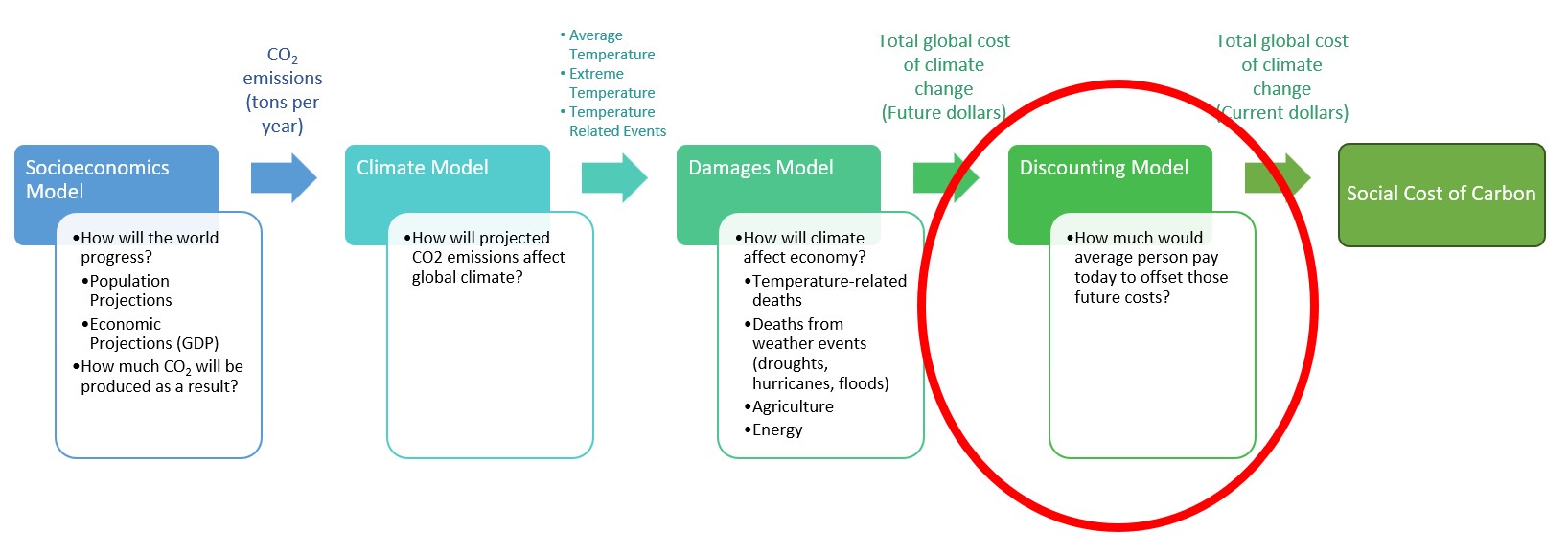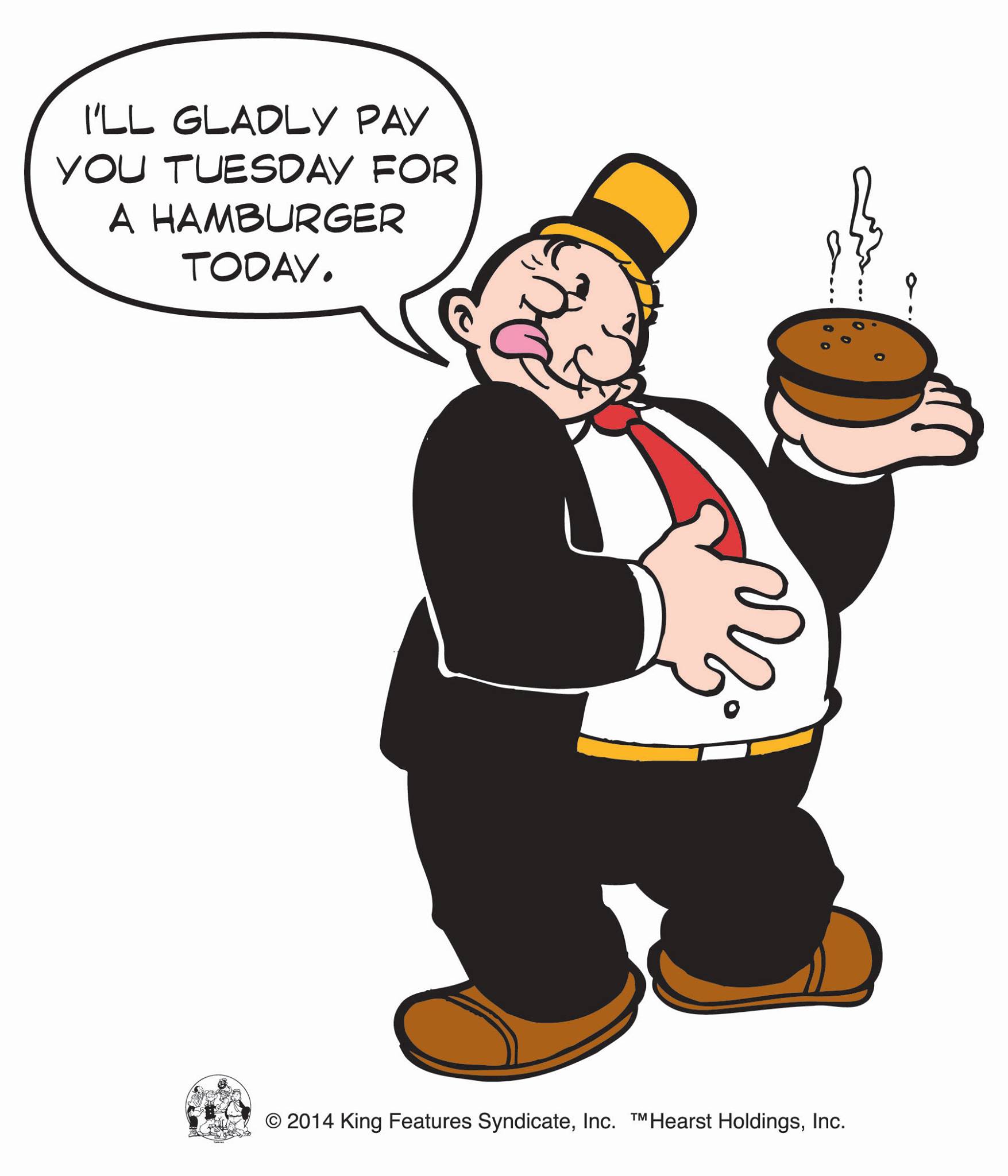Part of the amazingly complex and voluminous analysis used to propose nearly quadrupling the social cost of carbon is based on converting future costs to a present-day dollar figure.

Simply put, the way the social cost of carbon is determined is that future costs of global warming are estimated (additional deaths, loss of agriculture, loss of property from climate damage, etc.), but to apply those future costs to determine today's policy they must be "discounted". Discounting is used often in the private sector to determine the value of future investments and decide whether spending money today is worth the returns in the future.
The social cost of carbon works similarly but in the opposite direction: should we spend money today to avoid the costs in the future? The reason this must be done is that we have a choice of spending the money today on reducing carbon emissions or also on building new factories or power plants, so the purpose of discounting is to decide which avenue will produce the most benefit/lowest cost.
In his review of the proposed policy, Maxim Lott goes into considerable detail about the discount rates used. I will not reiterate his arguments, but his main points are that the EPA is using a discount rate that is lower than was used before and relies on the most recent experience of low interest rates, which may not be representative of the future 200 years, and the discount rate they used is largely responible for the significant rise in the cost of carbon. These are essential points, but there are also other reasons the 2% rate that EPA relies on should not be used.
World Rate
Of the many differences between how Republicans determine a social cost of carbon and how the Democrats do, is the latter estimate costs incurred by the planet as a whole, while Republicans estimate only the costs incurred by Americans. Resources for the Future, a group deeply involved in this process and policy, estimated that the global costs are more than 80% of the total cost of carbon.
While whether the US should consider the global costs of its policies when considering regulations of the US economy is up for debate, it should not simultaneously be calculating the costs on a world-wide basis and discounting based on only on U.S. factors. The idea of discounting is asking yourself the question 'how much money would I need in the future to make me prefer investing it today instead of spending it?'
If you buy a 30-year Treasury Bond today, the interest rate is 3.63%, meaning you'd turn every $1 you invested into $2.91 in 30 years, but you couldn't spend it until then. So, in some sense, you'd be saying that you'd prefer the $2.91 in 30 years to the $1 today. That's the concept behind the discount rate. Every person has their own preference for long-term spending, and even that preference changes over time.
For the calculation, the EPA uses 2.0%, based on the recent experience in the U.S. For U.S.-exclusive applications, it is not a problem to attempt to take the average preferences of all Americans, but because this rule is discounting the world-wide costs of climate-change, that is no longer appropriate. This causes the question to be 'how much money would the world need to have to make me prefer investing it today instead of spending it?'.
This question is a non-sequiter. Perhaps there's an answer to the question, but the answer surely isn't the average interest rate on bonds in the United States.
Using the U.S.-based discount rate would also cause other countries that want to calculate their own social cost of carbon to settle on different values even if they estimated the exact same costs to climate change. Europe, for example, has even lower interest rates. This approach would mean that it would be acceptable for the United States to produce more CO2 than Europe, and perhaps even some developing countries. Japan's interest rate would lead to substantially lower ability to emit carbon than the United States.
This approach would mean that it would be acceptable for the United States to produce more CO2 than Europe
The only reasonable solution is to determine a discount rate based on global economic conditions, not just the United States
US Experience
One of Lott's arguments about the discount rate is that the recent experience with interest rates is not representative of its longer history, beyond the past 10 years. In addition to that, before 2021, US interest rates were at historic lows, in fact. From 2000 to 2020, the United States was regarded by many to be the safest place for other countries and investors to put their money, particularly during the financial crisis, the Euro crisis, and then the Covid pandemic. "[In 2008], Treasury bonds were in such hot demand that American interest rates plummeted." To base the next 200 years of policy off of interest rates during this time seems highly selective and ill-advised.
Given the purpose of the discount rate, it's not even clear that using 10-year treasury returns is the appropriate metric. Republican administrations tend to use a higher discount rate, such as 7%, based on stock returns. This, on the contrary may be too high. Essentially, this number should represent the tradeoff between investing and consuming. Most people who are saving their money for 30 years, aren't doing so expecting 2.0% interest. It would seem a more inclusive metric should be used than government bonds, which to a large extent, represent the security of the U.S. government that Americans and non-Americans expect.
Literature
The EPA's proposed rule cites three studies to support its choice of discount rate. The 2018 paper surveyed economists who have published a paper on discounting. The survey produced an average of 2.3% and a median of 2.0%. The 2020 paper also surveyed experts who had published, but the publication topic was climate change and not discounting. It also produced an average of 2.3% and a median of 2.0%.
Even climate scientists believe the discount rate should be much greater than that used by the EPA.
Lastly, a paper authored by Pindyck surveyed economists, but found a higher mean of 2.7%. This paper, also broke down the estimates by region and profession. Notably, climate scientists chose 3.13% on average, and developing country scientists chose 4.14% on average. European respondents produced the lowest average followed by Americans and then developing country scientists. This supports the notion that the discount rates used are highly location-specific, and Americans' recent experience in a low-rate environment might be biasing their considerations given the purpose of the discount rates. Even so, the average respondent in all three surveys opted for higher rates than what the EPA chose.
The average respondent in all three surveys opted for higher rates than what the EPA chose.

